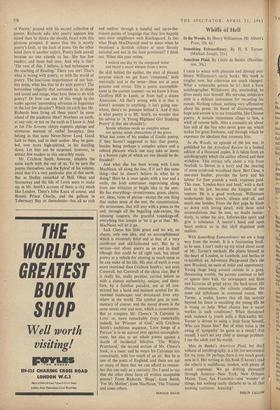Whiffs of Hell
Something Extraordinary. By H. S. Turner. (Michael Joseph, 21s.)
I USED to wince with pleasure and dismay over Henry Williamson's early books. His work is tougher now, but otherwise not much changed. What a vulnerable person he is! And a born autobiographer. Withdrawn, shy, overlooked, he dives easily into himself. His nervous, subjective style is a delicate instrument for recording his moods. Nothing robust, nothing very affirmative about his prose. Its blend of discouragement, hope and sorrow is to me irresistible, like Chinese poetry. A certain remoteness clings to him, a whiff of remote hells. Also a romantic air about him still of the boy who never grew up, which makes for great freshness, and through which he expresses the idealism that torments him.
In the Woods, an episode of the last war, is published for the Aylesford Review in a limited edition of a thousand copies. It is taken from an autobiography which the author offered and then withdrew. This extract tells about a trip from Norfolk to Devon in a lorry and the clearing of some scrub-oak woodland there. Bert Close, a one-man haulier, provides the lorry and his labour for four pounds a week, expenses paid. This man, `London-born and bred,' with a dark look to his jaw, becomes the kingpin of the venture. He is a good workman. Williamson understands him, scowls, silence and- all, and much else besides. From the first page he binds us down with loving detail, with those solid accumulitions that he uses, no doubt instinc- tively, to tether his airy, Jefferies-like spirit and give it substance. A master's hand and open heart enthral us in this idyll disguised with realism.
With Something Extraordinary we are a long way from the woods. It is a fascinating book, to be sure. I can't make up my mind about some of Mr. Turner's methods. He plants himself in the heart of London, in Lambeth, and battles to re-establish an Adventure Playground (he's the new Warden), an oasis of order and opportunity. Young thugs hang around outside in a gang, threatening trouble, the parents continue to belt or ignore their kids, the newspapers and films and factories all grind away, the back-street life churns remorseless, the schools continue the same old syllabuses in crammed rooms. Mr. Turner, a realist, knows that all this activity beyond his fence is moulding the young life he is trying to help. What chance has a social worker in such conditions? When threatened with violence (a youth pulls a flick-knife) Mr. Turner is driven to using a little force himself. Who can blame him? But of what value is the swing of 'sympathy' he gains as a result? For myself, I can't see any child or teenage problem. I see the adult and his world.
. Miss de Banke's American Plaid, her third volume of autobiography, is a bit too sentimental for my taste. Or perhaps there is too much good- ness in it. Her writing in this book (I haven't read the others) is mellifluous, modest, with plenty of stock responses. We go drifting pleasantly through America—New York, New Orleans, Maine, Taos, San Francisco—and 'wonder' at things, but nothing really disturbs us in all that teeming continent. Amazing!
PHILIP CALLMN














































 Previous page
Previous page